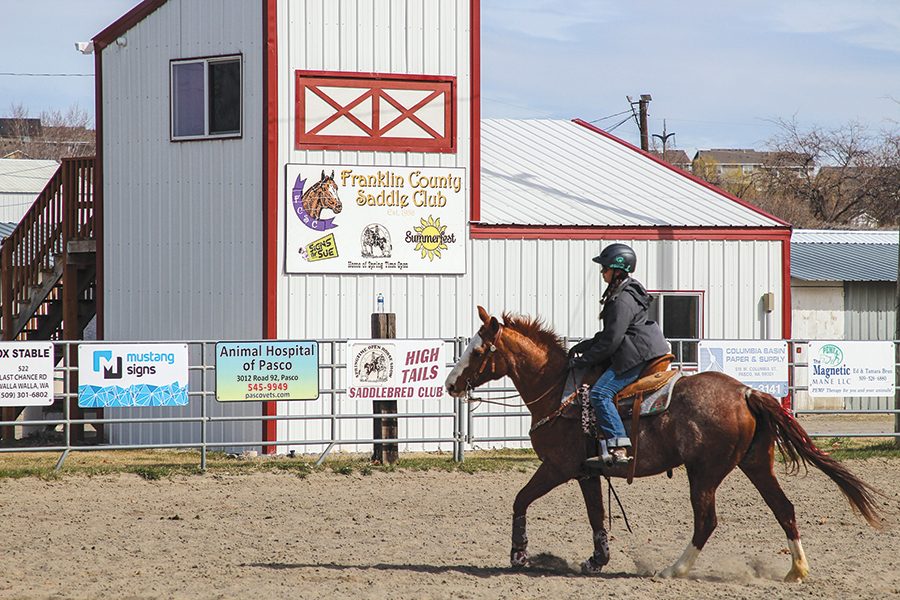
Home » Franklin County Saddle Club harnesses nonprofit status to create stable future
Franklin County Saddle Club harnesses nonprofit status to create stable future

April 12, 2023
By Jamie Council for Tri-Cities Area Journal of Business
The Franklin County Saddle Club has always operated as a nonprofit, but it is leveling up.
It recently registered as a 501(c)(3) nonprofit to reach its business goals and offer more to the business and equine community of Pasco and surrounding areas.
“Since 1959 when we were first established as a corporation, we’ve been operating as a nonprofit in Washington state, but we’ve never gone through the process of going through the IRS and getting the designation,” said Laurie Tufford, club treasurer and board member.
“We started thinking like, ‘This as a business and what we can do to increase the club?’ Getting the designation allows us to receive donations that can be written off on your taxes. It also allows us to apply for grants. Our whole goal is to boost the facility up.”
The 15-acre facility is tucked away a couple blocks from Road 68 in Pasco at 2801 N. Road 60.
The club has been around since 1956 with the goal of creating well-educated horsemen with a focus on youth and providing a safe space to grow the sport of equine. It’s been at the present location since 1960.
“A lot of people don’t know that we even have this facility,” Tufford said. “Now that Pasco has grown around us, more people have become aware.”
The club offers annual membership that allows access to its facilities, day rider permits for those not in the club, Washington State Horsemen “B” System shows, other events and a training facility for various youth riding groups, including 4H and a local high school group.
A few members also give riding lessons on the grounds.
The Pasco facility also has served as a haven for horses throughout the decades – when the Yakima River floods West Richland, or fires endanger nearby farms.
Financial challenges
The club operates on around $70,000 a year, which comes from member and show fees.
“We basically break even,” Tufford said.
The club currently has about 90 members. Its $275 annual membership fee is discounted to $175 with a community service agreement of 18 hours back to the club.
This agreement keeps the group afloat as it can’t afford property maintenance. However, as the property ages, it’s less viable as a business plan.
When issues come up, like a $10,000 bill for tree removal and trimming, the club dips into the reserve fund.
“We can continue to be doing the bare minimum with what we have, but for how long?” Tufford said. “It would take one major financial hit to put us under. If a tractor breaks, we’re toast. We’re getting to the point where things are getting so old, they need to be updated and that was our main thinking behind getting the new designation.”
Needed upgrades
The club’s facility consists of a two-story 2,280-square-foot clubhouse, four arenas, 116 stalls and a trail course. Most of the buildings are in desperate need of repairs, upgrades and additions to help grow with the sport in the region, Tufford said.
The club is the only facility in the area that holds Washington State Horsemen shows. Other shows take place in Walla Walla and Spokane.
Tufford serves as the show committee chairperson. She has been a part of the club since 1986 and said not too much has changed with the facilities since she arrived.
“The stalls are outdated, and they basically need to be torn down completely,” she said. “We need another barn like the yellow barn to replace those, to have more stalls available.”
The shows bring in about $25,000 per year, but with improvements, growth opportunities would take the club to the next level. Other needed upgrades include electrical infrastructure to accommodate RVs and replacing the arena lights.
“In the olden days, everyone had a camper and a tent. Now they have 45-foot RVs that take a ton of electricity and they have air conditioners. … So when we have everyone blowing their air conditioners, it blows our circuits,” Tufford said.
Adding a covering to the arena also would be a huge advantage. Not only could the club extend the show season past June to weather the heat, but it would allow the facility to host more events such as Washington State Junior Horsemen Association competitions.
The Columbia Burbank Equestrian Team has been practicing at the Franklin County Saddle Club for more than a decade, but it competes at other facilities.
“We actually put in a bid to host WSJHA events,” Tufford said, “but we lose those bids because we don’t have a covered arena. We’d also be able to bring in a national show or some of the bigger ranch events.”
However, the club has been able to make some improvements in the past few years.
The club replaced speaker wires in the main arenas, added a bridge to the trail course and built an announcer’s booth and office by the main arena.
“The membership did it,” said Tufford of the announcer’s booth. “We framed it. I put the flooring in, someone else did the concrete. It really is a labor of love in this whole place.”
While the club exists to build the equine community, it also helps build the community around it, she said.
“It’s not unusual for us at our big shows to have 100 horses,” Tufford said. “If we could make that 150, people aren’t going to sleep here. They’re going to sleep in hotels. They’re going to eat off Road 68. We don’t offer food here. You have all those people that want to watch their kids participate, trainers, students, it all adds it. The more people and tourism that comes, the better for the community as a whole.”
Go to: franklincountysaddleclub.org.
Real Estate & Construction Local News
KEYWORDS april 2023





